Iranian press review: From gold handouts to free fuel, presidential candidates make wild promises

Candidates make unbelievable campaign promises
The presidential campaign of the six candidates in Iran has been marked by accusations and strange promises that have captured public attention.
The Khabar Online website reviewed these promises and compiled a list of the most unrealistic ones made during the campaigns.
Before pulling out of the presidential race on Thursday, Alireza Zakani, Tehran’s fundamentalist mayor, made a number of unfeasible promises.
“Zakani is the leader of grand promises. He, who does not even accept responsibility for what happened under his tenure, has promised to give 20 grams of gold to every Iranian household to mitigate the impact of inflation,” wrote the Farsi website.
New MEE newsletter: Jerusalem Dispatch
Sign up to get the latest insights and analysis on Israel-Palestine, alongside Turkey Unpacked and other MEE newsletters
Zakani's other eyebrow-raising promises included halving the price of petrol, providing free insurance for all children under seven, pregnant women, and grandparents, as well as distributing meat door-to-door.
Mostafa Pourmohamadi, a former security and judicial official, also promised to reduce petrol prices, going a step further by saying his administration would provide free fuel to citizens.
Amir-Hossein Ghazizadeh Hashemi, a former member of the Basij paramilitary group, also gained attention for his promise to give 10 billion Iranian rials (about $17,000 in the open market) to young people who want to marry.
Ghazizadeh Hashemi also withdrew his name for the presidential election on Thursday, leaving four contenders, including one reformist, in the race.
“He who claims he will choose the minister of education with the votes of teachers, also said he will solve the stock market problem in less than three days,” reported Khabar Online.
Due to the ongoing economic crisis, all six presidential candidates have focused a significant part of their campaigns on solutions to the crisis and providing economic support to low-income segments of society.
Candidate defends mass killing of political prisoners
Mostafa Pourmohammadi, a conservative cleric running in the presidential election in Iran, made a rare move by defending his role in the execution of thousands of leftist political activists serving prison terms in 1988.
Iranian officials typically avoid discussing this period in Iran’s history, during which the establishment executed thousands of political prisoners, some of whom were nearing the end of their sentences and awaiting release.
In a televised interview, Pourmohammadi, who was part of a four-member committee responsible for deciding which prisoners would be executed in Tehran and Karaj, defended his involvement in the killings. He claimed that the executions were a decision made by the establishment.
When the interviewer noted that his name is closely associated with these executions, he responded: “So what should I do? The project belonged to the Islamic Republic [of Iran], not to Pourmohammadi. Don’t be mistaken about it.”
Defending his actions, the former Islamic Sharia judge compared himself to a surgeon: “I served as a judge for a while. My duties included trying cases and writing indictments. Some individuals were fined, some were imprisoned, and some were executed. It’s similar to a surgeon whose name is associated with performing surgeries.”
At the same time, as Pourmohammadi publicly defended the extrajudicial execution of prisoners, the establishment increased pressure on the families of the activists killed in 1988.
According to Radio Zamaneh, last Friday, security forces banned family members from visiting the unmarked mass graves in the Khavaran cemetery for the second time in the past month.
Although the graves of the executed political activists are unmarked, families gather at this cemetery every Friday to remember their loved ones, whose bodies were never returned to them.
Four political prisoners sentenced to 33 years and 518 lashes
Iran’s judiciary has sentenced four political prisoners to a combined total of 33 years in prison and 518 lashes, the Human Rights Activists News Agency (HRANA) reported.
Lughman Aminpour, Meysam Dehbanzadeh, Majid Roshannejad, and Reza Salmanzadeh were tried in connection to a deadly fire in Tehran's notorious Evin Prison during the widespread anti-establishment protests of 2022.
According to this report, the trials were conducted in the absence of the defendants' lawyers.
Aminpour, Dehbanzadeh and Roshannejad each received six-year prison terms and 74 lashes for "property destruction", 16 months and 74 lashes for "disrupting prison order", and an additional 16 months for "disobeying and resisting orders from officials."
Salmanzadeh was sentenced to five years in prison and 74 lashes for "property destruction", one year for "disrupting prison order", and another year for "disobeying and resisting orders from officials".
Iran's Prisons Organisation initiated cases against 36 other inmates related to the same incident, though no further information about these trials has been released.
The deadly fire, which erupted in Evin Prison's wards seven and eight, resulted in the confirmed deaths of at least 12 prisoners.
Initially, officials reported that 61 inmates were injured, but authorities have not disclosed the full scope of the incident.
Iranian press review is a digest of news reports not independently verified by Middle East Eye
Middle East Eye delivers independent and unrivalled coverage and analysis of the Middle East, North Africa and beyond. To learn more about republishing this content and the associated fees, please fill out this form. More about MEE can be found here.






